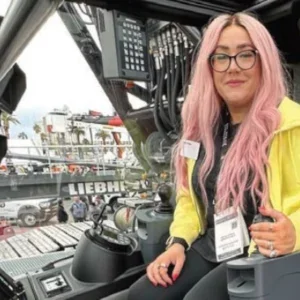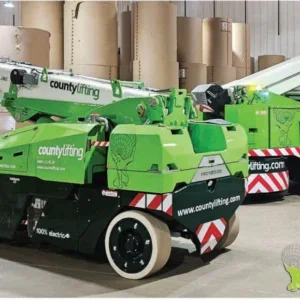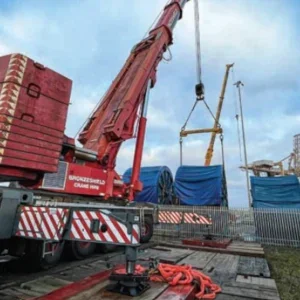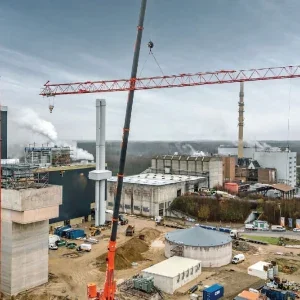In 1998, Ray Anthony sold Maxim, the national crane rental firm he had started as Anthony Crane Rental twenty years before, and left the crane industry. Five years later, when his non-compete clause was up, he was back in business, in Ft Lauderdale, Florida.

Ray Anthony
Today he has six depots in southern Florida, and in Pittsburgh as well. He expects to close on his second acquisition, Sun-Belt Crane Rental of Tampa and Bradenton, Florida, this month. (He also bought Sparks in St Petersburg, Florida, in 2004). The company’s cranes will be folded into Anthony, but the company’s other line of business, heavy hauling, will form a new business, Sun-Belt Heavy Haul.
“We’ve always been in the hauling business. In fact, I used to drive a low-boy. But I have never worked in the heavy hauling business,” Anthony says. It is just one of many new starts for Anthony.

Anthony mobile on a tilt-up job
He decided to start up in Florida after vacationing. “I had a lot of friends here and a good opportunity to get started. There were a few people who I wanted to work with and Florida was really busy. The cranes just never sat.” The construction boom is dominated by population growth: “Everybody in the States wants to move to Florida, where there is good weather and sunshine all the time. They need houses and hotels.”
Which is not to say that there was not a culture shock. “South Florida and Ft Lauderdale are funny places to work. St Pete, Tampa, there is a good work ethic -and in Pittsburgh and Texas, too.”

Unusually, the company rents tower cranes as well as mobiles
He said he now sees business tailing off in Florida. “We’re putting pressure on Houston,” Anthony says. He is planning to open a depot next door in Laporte, Texas this month. “That’s where we are going to go until things in Florida settle down. No matter where we go now, we are getting others’ work. We’re still new. We won’t be new soon. We are getting well-known, and we will get our own market, and we won’t be able to take much market share.
“We just started the Pittsburgh operation 4–5 months ago. It’s mostly RTs and a few truck cranes developing now. I’m expecting that depot to grow to use 50–60 truck cranes, travelling down into West Virginia and Pennsylvania. There are some big companies in Pittsburgh: All, Maxim. It’s tough to go in there and make a bang.
“But we are going to be very aggressive in Houston. The competitors in Houston are all sitting back. They are all fat and rich and having a good time. We’ll have to give them a wake-up call when we get there. I’m looking forward to being full-fledged in Houston by the end of the year. We’re buying a property with a shop, mechanics, a shop foreman, a parts department. If you don’t have that, you are not going to do it. If you don’t have the back up to take care of your equipment, you are finished.”

A nightime crane set-up
Anthony is sending over Miami and Pompao Beach, Florida, manager Dave Beck and half a dozen cranes to start the company’s assault on Houston’s recession-proof crane economy. “Oil and gas will carry on doing well, until the end of my lifetime.”
He insists that he has another 20 years of work left in him. But it was concerns about how much longer he was going to last that forced him out the first time. He decided to sell Maxim after heart bypass surgery in the mid-90s. “Hell, I was just as happy as ever.
But I was advised to sell out, so I did.”
By 2003, he was back in the business. “I’d probably have come in earlier.
I’m not happy not being around cranes.
I missed the excitement of cranes, supplying jobs, making people happy, having people around that knew about construction.”

An Anthony mobile crane sets up a tower jib
While he was out of the business, he bought a car dealership (New Auto Toy Store, Ft Lauderdale), a marina (Aqua Toy Store, in Ft Lauderdale), a gun shop (Anthony Arms & Shooting Center, in Pittsburgh). “I operated these like pastimes,” he said. Anthony also owns Anthony Aviation, in Pompano Beach, Florida, and in Pittsburgh, Pennsylvania, 3D Trucking and the huge steelwork contractor Century Steel.
CT: What have you learned?
RA: I have seen a lot of crane companies that don’t know what they are doing. I’ve seen people not taking care of their equipment, not supplying cranes on time, not paying attention to business. I have seen part-time owners that didn’t care what is going on.
“I have seen a lot of companies floating along, doing well without heavy management, thinking ‘this is getting to be easy’. I brought a lot of people back, and we can make it. Florida is a lot busier now, it’s hard to get good people to work. It’s vacationland: it’s hard to get people who are interested in working.”
CT: What’s your approach?
RA: We put in the work culture. People who we hire see that we are working hard, and they think, ‘Okay!’ I don’t have an idea that you the crane operators are working for me, you work with me. I’ll go on the crane with them. The last time I was on a crane was a month ago, when a crane operator didn’t show up. I’m a good crane operator. I enjoy it. All of my managers are capable of going out there. I had a manager who spent a week driving a crane to save a job. That’s the kind of people I have right now. It’s very difficult finding good people. We’re trying to get people to come from Maxim to us. We’re picking and choosing. We’re not buying people, they are part of a working team. These guys often get shuffled around at other companies. We have meetings together, I eat lunch with them, there is a camaraderie. Of course we pay a competitive price, but we say, as the company grows, you’ll grow too.
“I have Dick Ferchak, the CEO of the company, who manages all my managers. Each branch has its own managers, including the stores, who work under him. My role is to manage, to teach, to be around, to have lunch with customers, to have meetings: I am very active.”
At its height, Anthony had 35 branches, from San Francisco to Philadelphia. Anthony said it was a strain. “It wasn’t too much to handle then, but I was ten years younger then. I could still handle it now. But there was three hours’ time difference with San Francisco and Los Angeles. We were solid in Texas, Florida, Georgia, and the west coast was a whole different environment.”
CT: Is it still possible to run a proper national crane rental company?
RA: All Erection is a very good national company. It has good business ethics, and good leadership. Mike Liptak is a good guy. When I had Anthony, I had the best people in the country, I had a Superbowl team. If you are going big, to do what you need to do, you have to have lots of people who are at least as committed as you are.” He says that he needs them to maintain stability by keeping the cranes in good condition, maintain customer relationships and communicate with the corporate office.

Anthony on site
Anthony says that he is not limiting the size of his ambitions now. “Let’s take it as it goes.”
CT: What have you learned from starting the time around?
RA: I am probably still making now the mistakes I made the first time around. I don’t think very much has changed. You don’t have to be a genius to be in the crane industry. You have to have a lot of heart, guts, and be good to people. It doesn’t take much education, just a lot of common sense. I don’t think I’ve changed since I got into it last time.
“If you get too smart, it makes you too dumb. If you think about something too much, you can outthink yourself. I bought my first hydraulic crane way back in 1968, a Warner & Swasey. Everybody in Pittsburgh was asking me, why did you buy a hydraulic? Everybody is buying mechanical cranes. If I’d have been smarter, I might not have bought a hydraulic. As it was, I bought one and made it work.”
Keeping up with the latest technology remains an issue for Anthony, 40 years on. After his five-year break from the industry, he found it a different place. “I have seen more computers on cranes than before, and all of this CCO testing of operators. There was a lot to catch up to.
“Cranes are too complicated. Every time they break down, whether a Grove, Demag or Liebherr, it’s always the computer. We have gotten so deep into computers and safety that it’s unsafe. Somebody was so smart to invent these computers, but they have ruined the industry. We have a hard time handling them. We know how to fix a spring, bend back a bent boom. But with a computer, you have to have someone technical. We have rough, tough crane operators and mechanics who can tear down and put together a crane in 15 minutes, but give them a computer and they are lost.”
In January, Anthony ordered $25m of cranes from Terex for a mixture of rough terrain cranes, all terrains from Demag in Germany and truck cranes from Terex-Waverly. “I don’t see anyone in the US building anything over 60–70 US ton capacity cranes. For a big hydraulic crane, you have to go to Germany. When I started, the biggest crane we had was a 150 US ton hydraulic from Grove. It was so heavy that we couldn’t move it on the roads: it kept getting knocked off by the police. The Germans (from Krupp) told me that they had a 175 US ton hydraulic that was also much lighter to move. The Germans make it so easy to remove the boom and counterweights.”
The rule of ‘bigger is better’ continues to be true in the crane industry. “In Texas in the 80s, if you didn’t go bigger, you didn’t get the jobs. If you don’t have a 500-tonner, you are renting it off someone else, and off someone else’s mercy. But if you get that crane off of Ray Anthony today, you’ll be able to get a 200 tomorrow,” he says, promoting the company’s customer service. Still, he admits that Anthony does occasionally hire cranes from competitors. He is awaiting a new 850 US ton Demag AC 700 for November.
He does not rule out buying a Chinese crane. “I wouldn’t have a problem; I would have to look at it. I hear they are fairly good quality, and there are a lot of common components.”
Anthony admits that crane supply is a problem now. “We put in orders with Terex two years ago, so we are getting some cranes now. But that’s why we are buying some used. We are trying to stick with Terex. They are good people, have good service, and we have a good rapport with them, we are on a first-name basis. A relationship is important. That’s what my company is about. If you have a problem with a crane, you can talk to the top guy. You can’t get a lot of the top guys in the industry: they are too busy.”
Anthony mobile on a tilt-up job Anthony mobile on a tilt-up job Unusually, the company rents tower cranes as well as mobiles Anthony tower crane Ray Anthony Ray Anthony A nightime crane set-up A nightime crane set-up An Anthony mobile crane sets up a tower jib Anthony mobile installing a tower Anthony on site Anthony on site






